Decedents’ Estates on the Multistate Essay Exam: Highly Tested Topics and Tips
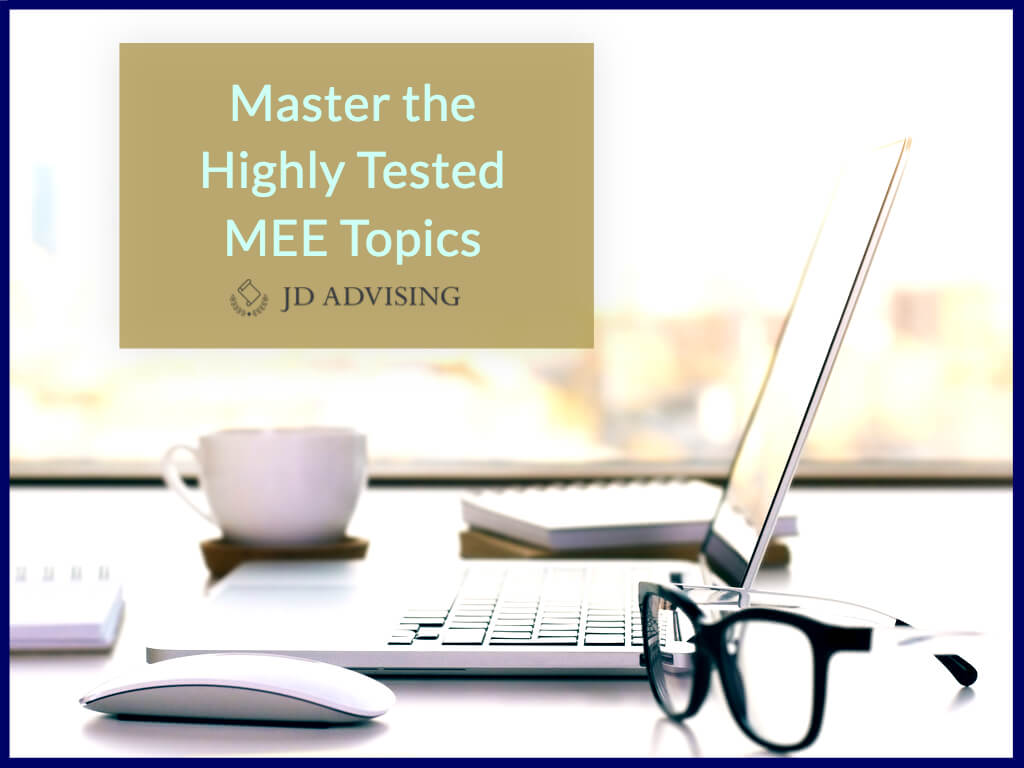 Decedents’ Estates on the Multistate Essay Exam: Highly Tested Topics and Tips
Decedents’ Estates on the Multistate Essay Exam: Highly Tested Topics and Tips
Here, we give you an overview of Decedents’ Estates on the MEE. We will reveal some of the highly tested topics and give you tips for approaching Decedents’ Estates MEE questions.
Decedents’ Estates on the Multistate Essay Exam
1. First, be aware of how Decedent’s Estates is tested on the Multistate Essay Exam
Decedent’s Estates is tested regularly on the MEE. In the past, Decedents’ Estates was tested about once a year to once every year and a half or two years Recently, however, Decedents’ Estates has been tested more frequently—even appearing on the MEE twice a year in both 2020 and 2021, then again in July 2022 and February 2023. Decedents’ Estates is usually tested alone but is occasionally combined with Conflict of Laws and with Trusts and Future Interests.
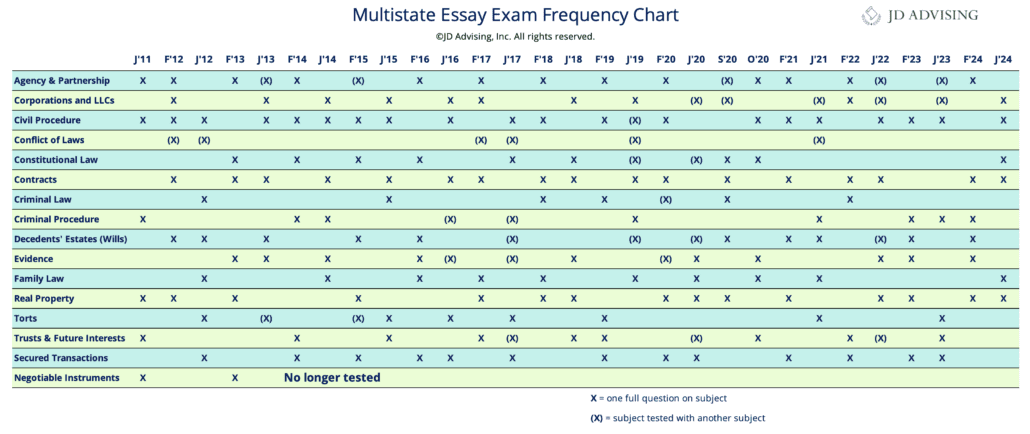
2. Be aware of the highly tested Decedents’ Estates issues
The examiners tend to test several of the same issues in Decedents’ Estates MEE questions. You can maximize your score by being aware of these highly tested issues. (We have a summary of these in our MEE One-Sheets if you want to see all of them and have them all in one place.)
Some of the highly tested Decedents’ Estates Multistate Essay Exam issues include:
Intestate succession
One of the more frequent fact patterns in Decedents’ Estates MEE questions is a decedent who dies without a will or whose will is invalid. When that happens, the decedent is said to die “intestate.” To determine how an intestate decedent’s property should be distributed, courts use the laws of intestate succession.
According to the laws of intestate succession, if the decedent’s spouse and parents do not survive the testator, there are two main schemes to divide the property among the children.
The first is per capita at each generation. The key principle here is that those in the same generation always inherit the same amount. To decide how the property should be divided, find the first generation where there are children living. Then, give one share to each living child and one share for each in that generation who predeceased the decedent but left surviving children of their own. Then, combine all the shares of the deceased persons and divide them equally at the next generational level. The second scheme is per capita with representation (or modern per stirpes). The key principle here is that heirs receive the representative shares of their parents. This process begins the same as above, but instead of combining the shares of the deceased to distribute evenly, the children of the deceased take the exact share that their deceased parents would have had.
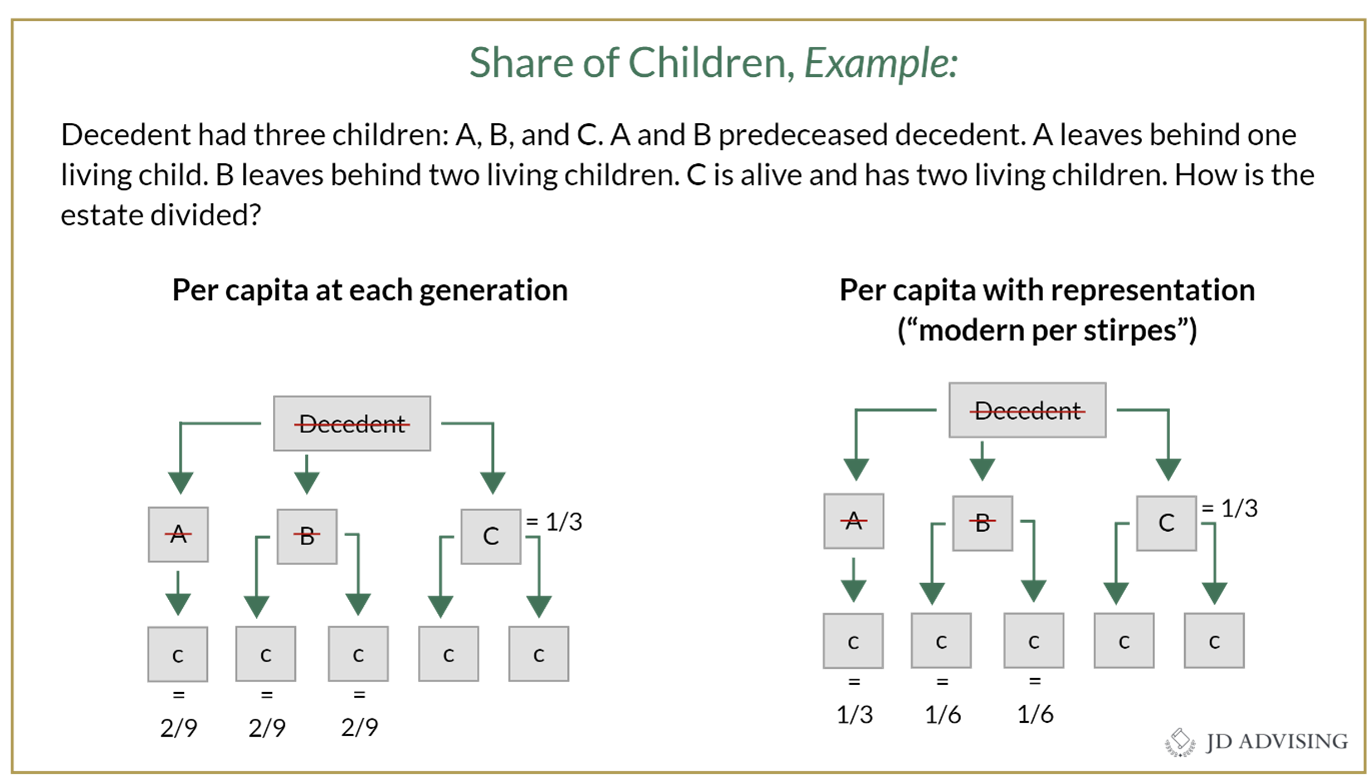
Validity of a will
In many states, a valid will must be in writing, signed by the testator, and witnessed by two witnesses. Additionally, the testator must be 18 years of age or older and have the intent that the document serve as his will. However, if you see an unwitnessed will on a Decedents’ Estates MEE question, consider whether the document could serve as a holographic will. Holographic wills are unwitnessed wills and are recognized by about half the states. Holographic wills are valid if signed and (in many states) the material portions are in the testator’s handwriting. For states that follow the Uniform Probate Code (UPC), courts may use their dispensing power to save an invalid will so long as there is clear and convincing evidence that the decedent intended the document to be their will.
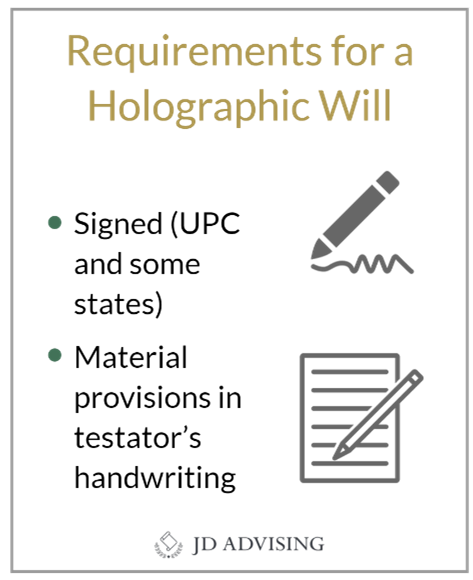
MEE Tip: Remember that even if it appears there is not a valid will, you should still list the requirements (and note that they are not met) before discussing holographic wills or the dispensing power. Connect all the dots for the grader by explaining how you reached your conclusion to maximize your score!
Revocation of a will
Revocation by a physical act can occur by the execution of a new will or by some other physical act, such as cancellation or other writings on the document. The act of revocation must be done with the intent to revoke the will. Either the testator or someone acting at the testator’s direction and in his conscious presence may revoke the will. Under the dependent relative revocation doctrine, a first will is not revoked if a later will is found invalid. If a testator revokes a will or bequest based on mistaken assumptions of law or fact, the revocation of the will is ineffective if it appears that the testator would not have revoked had he had accurate information.
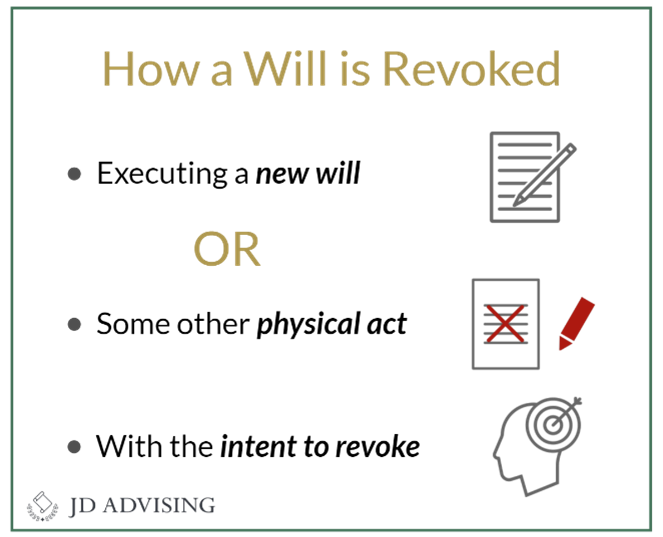
Additionally, divorce bars a former spouse from taking a gift made under a will that was executed prior to the divorce. There must actually be a final divorce, not just the filing for divorce.
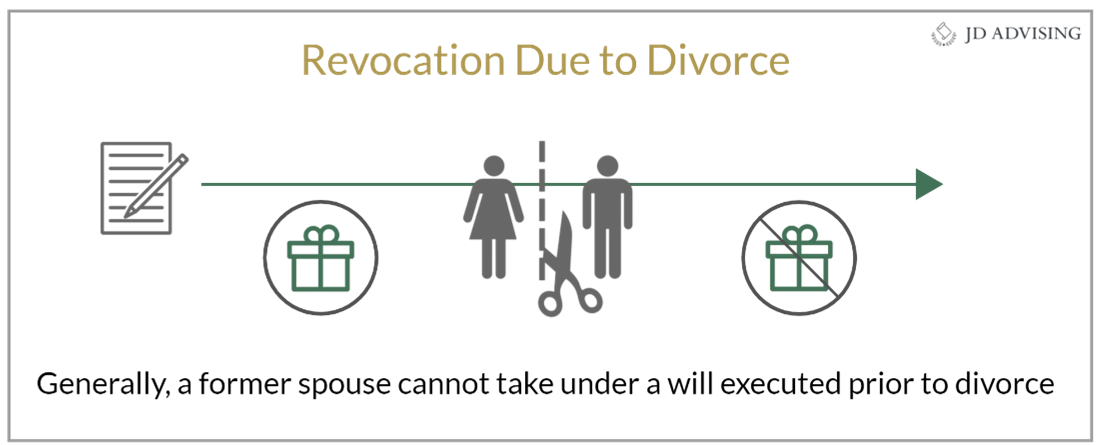
Slayer statutes
The slayer rule says that an individual who feloniously and intentionally kills the decedent or who is convicted of committing abuse, neglect, or exploitation with respect to the decedent forfeits all benefits with respect to the decedent’s estate. Voluntary manslaughter counts as a felonious and intentional killing, while involuntary manslaughter does not. Most states have codified the rule into statutes that are referred to as slayer statutes. If you see this concept tested on a Decedents’ Estates MEE question, pay close attention to whether the killing was actually felonious and intentional.
MEE Tip: Typically, on the MEE, the slayer statute will not bar the gift because the killing does not meet the requisite standard.
Antilapse statutes
The general rule is that if a beneficiary does not survive the testator, the gift to the beneficiary will “lapse” or fail and go to the residuary of the estate. However, all states have antilapse statutes. Under a typical antilapse statute, if a beneficiary dies before the testator and was related to the testator by blood and had issue who survived the testator, the gift to the beneficiary is “saved” from lapsing because the beneficiary’s issue will take the gift in lieu of the deceased beneficiary.
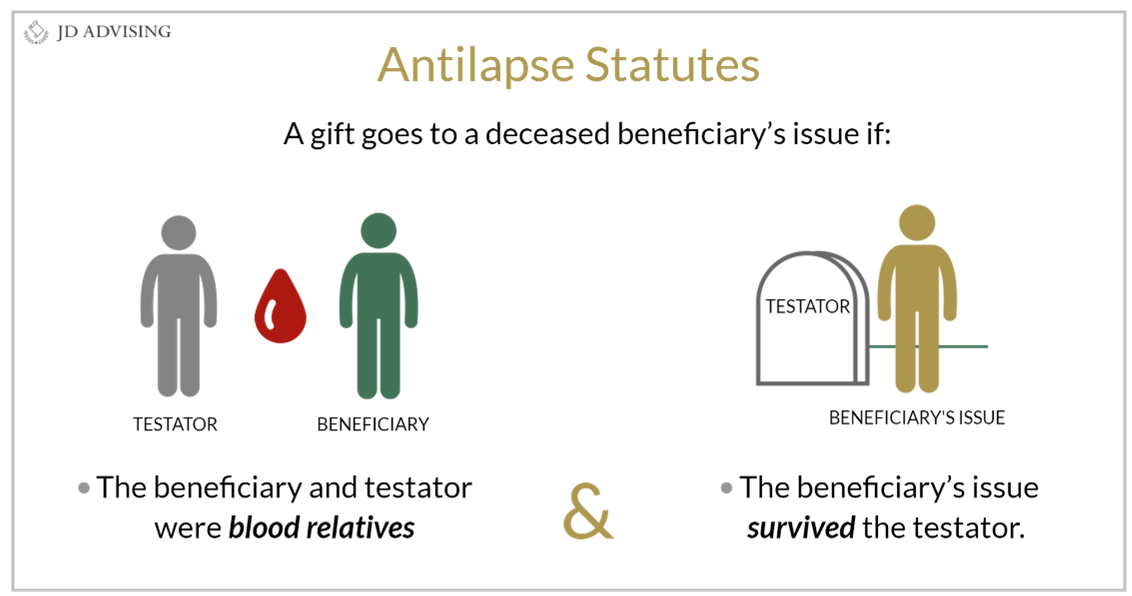
3. Make sure you understand the Decedents’ Estates vocabulary
You should be able to use and define basic Decedents’ Estates vocabulary in the answer to a MEE question. A MEE answer that does not use the appropriate vocabulary will appear incomplete. Further, it is easier to score higher if you understand exactly what the Decedents’ Estates vocabulary terms mean. Here, we list a few terms you should be familiar with:
- Ademption (failure of a gift)
- Codicil (a supplement to a will that modifies, adds, explains, or revokes a will)
- Descendant or issue (all lineal descendants—children, grandchildren)
- Devise or legacy (a fancy word for “gift” left by a will)
- Disclaim (to reject a gift, usually for tax purposes)
- Heirs (those who inherit property when the testator dies intestate—i.e., without a will)
- Intestate (to die without a will)
- Predecease (to die before someone)
- Testate (to die with a will)
- Testator (a person who dies with a will)
4. Focus on past MEEs in conjunction with your bar review outlines
Some commercial courses do not teach certain topics in Decedents’ Estates in the same way that it is tested on the MEE. Here are a few examples:
- Some courses mix up the words “per capita at each generation” and “per capita with representation.” This creates a problem for students because the NCBE defines the concepts one way but the courses define them differently.
- Most courses focus a lot on calculating the share of a surviving spouse. This concept has not been tested in much detail on the MEE.
- Whether only class members take a class gift, whether class members can devise their interest, or whether the antilapse statute will save a gift are all issues that are tested on the MEE but are sometimes not taught in detail by most commercial courses. (We teach them in our MEE Course and give an overview in our MEE One-Sheets).
- The MEE has tested the parentelic method and consanguinity method of determining heirship, which does not seem to be commonly covered by commercial courses.
- Some courses do not teach living wills or durable health care powers, which appear on the MEE.

These are just some examples of how some commercial courses fail to teach some of the topics that appear on Decedents’ Estates MEE questions. If your course does not teach these concepts, we recommend that you practice past MEEs so you can fill in any gaps in your outline and maximize your score!
5. Practice!
Practice is critical if you want to master Decedents’ Estates on the MEE.
Here, we provide you with some links to free Decedents’ Estates MEE questions and NCBE point sheets. (If you would like to purchase a book of Decedents’ Estates MEE questions and NCBE point sheets, check out our MEE books here. You can also see some additional exams on the NCBE website for free here.)
- February 2022 Decedents’ Estates MEE [combined with Trusts & Future Interests]: this MEE covers creation of a trust: trust res; termination of trust; creation of an oral trust; what constitutes a valid charitable purpose; rule against perpetuities; and laws of intestacy—per stirpes.
- July 2021 Decedents’ Estates MEE: this MEE covers antilapse statutes, express survivorship requirement vs. antilapse statute; heirs are those who take via intestacy; passing of a gift when residuary fails (common law vs. UPC approach).
- February 2016 Decedents’ Estates MEE: this MEE covers slayer statutes and durable power of attorney.
- July 2013 Decedents’ Estates MEE: this MEE covers prenuptial agreements, revocation of a will by operation of law (divorce), and adopted children.
Go to the next topic, Trusts and Future Interests
Seeking MEE Expertise?
🌟 Freebies & Discounts
- Free Bar Exam Resource Center: Explore for leading guides, articles, and webinars.
- Expert-Crafted Bar Exam Guides: Unveil insights on high-frequency MEE topics and strategies for success.
- Free Webinars: Engage with top bar exam experts.
🔥 Top-Rated MEE Resources
- MEE One-Sheets: Boost your confidence with our most popular bar exam product!
- Bar Exam Outlines: Our comprehensive and condensed bar exam outlines present key information in an organized, easy-to-digest layout.
- NEW MEE Mastery Class: Unearth focused, engaging reviews of essential MEE topics.
- Bar Exam Crash Course and Mini Outlines: Opt for a swift, comprehensive refresher.
- MEE Private Tutoring and feedback: Elevate your approach with tailored success strategies.
- MEE Course: Preview our acclaimed five-star program for unmatched instruction, outlines, and questions.
🔥 NEW! Dive deep into our Repeat Taker Bar Exam Course and discover our unrivaled Platinum Guarantee Pass Program.






Leave a Reply
Want to join the discussion?Feel free to contribute!